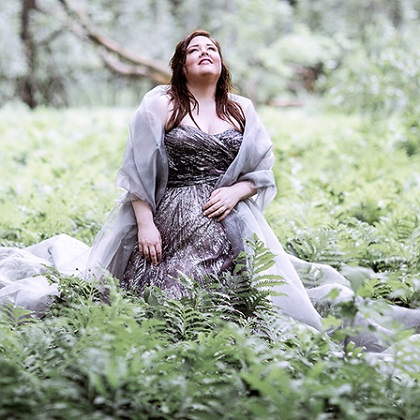 United States Warren, L. Boulanger, Beach, N. Boulanger, Haydn, Larsen, Ravel Duparc, R. Strauss: Jamie Barton (mezzo-soprano), Kathleen Kelly (piano), presented by San Francisco Performances, Herbst Hall, San Francisco. 11.12.2019. (HS)
United States Warren, L. Boulanger, Beach, N. Boulanger, Haydn, Larsen, Ravel Duparc, R. Strauss: Jamie Barton (mezzo-soprano), Kathleen Kelly (piano), presented by San Francisco Performances, Herbst Hall, San Francisco. 11.12.2019. (HS)

Elinor Remick Warren — ‘Heather’
Lili Boulanger — ‘Attente’
Amy Beach — ‘Ah, Love but a day!’
Nadia Boulanger — ’S’il arrive jamais’
Haydn — Arianna a Naxos
Libby Larsen — Love After 1950
Ravel — ‘Chanson à boire’
Duparc — ‘Phidylé’
R. Strauss — ‘Cäcilie’
As a singer Jamie Barton can pretty much do anything. The mezzo-soprano excels in such diverse music as Wagner (as Fricka in the Ring), Gluck (the title role in Orfeo ed Erudice), and Verdi (as Eboli in Don Carlo). And oh, speaking of diversity, she can use her recitals to make a strong case for neglected women composers.
Barton came to San Francisco as a stop over on – what she describes on her website as – her ‘Feminist Recital Tour’, with works written about women. Half of the program was composed by men, but whether the notes were set down by women or men the glory of the concert was Barton’s rich, supple, and disarmingly natural sound. It is lushly textured from top to bottom, with gleaming high notes and resonant lows. And, no matter what the style required, the voice was consistently placed in service of the text.
That was especially apparent in Libby Larsen’s Love After 1950, a set of five sassy songs the American-born composer wrote in 2000 — which dabbles in blues, torch-song, and tango — set to verses by Rita Dove, Julie Kane, and Muriel Rukeyser.
The showstopper was ‘Big sister says, 1967′, with side-splitting verse by Kathryne Daniels on the pain of beauty treatments, wrapped in a honky-tonk style. As the song begins and reiterates several times, ‘beauty hurts’, lamenting the side effects of hair rollers, depilatories, and tweezers.
In the first half, focused on carefully wrought classical forms, nothing could have prepared a listener for Larsen’s free-wheeling stuff. Aside from ‘Big sister’, there was the sensuality of ‘Boys’ Lips’ (not blues in form but certainly in style) and ‘Blonde men’ (in which the singer decries fair-haired males until the final line). A tango about a failed romance in Spain and a finale that pulsed to Rukeyser’s ‘Isadora’s Dance’ completed a set to treasure — for the musical delights, of course, but also because Barton could convey every word clearly, with purpose and style.
The program opened with a set of older songs by Elinor Remick Warren, Lili and Nadia Boulanger, and Amy Beach — all pioneers, writing when women were not taken seriously as composers. The Haydn cantata that followed, Arianna a Naxos, was written for soprano and keyboard, starting with an extensive prelude, played with soft edges by Barton’s longtime collaborator, pianist Kathryn Kelly. Especially striking was how easily Barton segued from emotionally specific recitative to heart-breaking lyricism in the aria, yet still was able to finish (despite the remnant of a cold that saw her cough discreetly between lines) with dazzlingly precise and fast coloratura.
The final set comprised songs by composers better known for writing for the soprano voice. Barton launched the set with a slightly inebriated take on Ravel’s ‘Chanson à boire’, floated gorgeous tone for the ‘repose’ refrains in Duparc’s ‘Phidylé’, and crescendoed to a powerful climax in Richard Strauss’s ‘Cäcilie’.
For an encore, Barton offered a warm gesture to Jake Heggie, the San Francisco-based composer enjoying the recital from the third row. ‘In the beginning…’ — from his tongue-in-cheek Of Gods and Cats — found Barton back in a wry mood, ending on a pitch-perfect ‘meow’. As they did with the rest of the evening, the audience lapped it up.
Harvey Steiman